|
|
|
Sort Order |
|
|
|
Items / Page
|
|
|
|
|
|
|
| Srl | Item |
| 1 |
ID:
092376
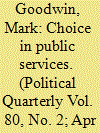

|
|
|
|
|
| Publication |
2009.
|
| Summary/Abstract |
Choice, diversity and personalisation have been key to the New Labour project in public services. With the emergence of a reinvigorated Conservative party as a credible electoral threat, and the end of the Blair era, it seems appropriate to consider the continuing viability and longevity of the New Labour public service project. In this article, I approach the issue of choice in public services through an examination of the long-running controversy over choice in the English secondary school system. I argue that the opponents of choice have been reluctant to engage with the notion of choice in public services due to concerns over the supposed negative effect that consumer choice has on the equity and quality of service provision. This paper aims to challenge the claim that any element of choice in education necessarily has deleterious effects on social justice. I argue that the case against school choice has not been decisively made and that school choice can, in principle, form part of a socially progressive educational project by redistributing power to service users and helping to maintain popular support for public provision of education.
|
|
|
|
|
|
|
|
|
|
|
|
|
|
|
|
| 2 |
ID:
092399
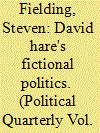

|
|
|
|
|
| Publication |
2009.
|
| Summary/Abstract |
David Hare is Britain's leading political dramatist. His Gethsemane premiered in November 2008, amidst anticipation that the play would 'crucify' New Labour. Gethsemane is in fact one of a number of fictionalisations of New Labour produced since 1997. These works have generally held up the party under Tony Blair's leadership to unmitigated criticism. Gethsemane certainly took Blair's premiership to task. However, despite increasing popular cynicism about Westminster politicians, Hare also suggested that politics remains a potential means through which honourable ends might still be achieved. However, already primed by the prevailing hostility to New Labour encouraged by earlier fictionalisations, few of those who reviewed Gethsemane noted Hare's tentative message of hope.
|
|
|
|
|
|
|
|
|
|
|
|
|
|
|
|
| 3 |
ID:
107208
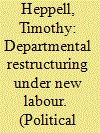

|
|
|
|
|
| Publication |
2011.
|
| Summary/Abstract |
Despite their emphasis on joined up government, which was to be one of the defining features of the New Labour governing project, attempts to enhance policy delivery would also result in major departmental restructuring within each of their three terms in office. This article asks three questions with regard to the New Labour and departmental restructuring. First, from a historical comparative perspective was there a greater degree of departmental restructuring under New Labour than under previous governments? Second, in the case of New Labour what was the motivation for departmental restructuring? Finally, was New Labour characterised by successful departmental restructurings? Utilising select committee material for the views of civil servants and combining this with questionnaire feedback from former New Labour ministers this article seeks to address these questions to assess the record of departmental restructuring in the New Labour era.
|
|
|
|
|
|
|
|
|
|
|
|
|
|
|
|
| 4 |
ID:
174004
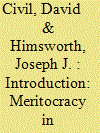

|
|
|
|
|
| Summary/Abstract |
Sixty years after its publication, Michael Young’s The Rise of the Meritocracy remains one of the most important texts for understanding the changing intellectual politics of postwar Britain. Young’s fictional vision of a meritocratic society explores the consequences of a society where each citizen is judged according to the formula ‘I.Q. + Effort = Merit’. The successful meritocrats hoard ever‐greater rewards for themselves, crystallising into a rigid and repressive elite who rule over an increasingly powerless and depressed underclass. While the concept has evolved and adapted, the language of meritocracy is one of the great survivors of postwar British politics. In an age characterised by the rise of populist leaders and movements, as well as a backlash against educated ‘liberal elites’, revisiting, reinterpreting and re‐evaluating Young’s influential satire and the central place the concept of meritocracy occupies in the history of postwar Britain has never been more important.
|
|
|
|
|
|
|
|
|
|
|
|
|
|
|
|
| 5 |
ID:
138271


|
|
|
|
|
| Summary/Abstract |
The British state is in flux and the Labour party is struggling to shape an effective response to the politics of disunification. This article reflects on the nature of Labour's governing project and its conception of modern statecraft which has evolved since the party became a serious contender for power in the aftermath of the First World War. We argue that Labour's initially pluralising instincts cultivated in opposition have been checked by the ongoing reality of a state-centric mode of governing, in which the party continued to robustly defend the Westminster model operating within the parameters established by the British Political Tradition (BPT). Ed Miliband's conception of ‘One Nation’ Labour threatens to reinforce this historical pattern of reversion to the Westminster model, at precisely the moment when devolutionary forces are destabilising the existing political settlement. To break out of this impasse, Labour must look elsewhere in its ideological lexicon for inspiration, chiefly to the tradition of socialist pluralism and associationalism.
|
|
|
|
|
|
|
|
|
|
|
|
|
|
|
|
| 6 |
ID:
092413
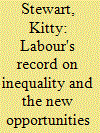

|
|
|
|
|
| Publication |
2009.
|
| Summary/Abstract |
In its first years in office, the Labour Government set out a wide-ranging and ambitious set of policies aimed at reducing poverty, inequality and social exclusion. A decade on, with the party facing probable catastrophic defeat in the next general election, how far can these ambitions be said to have been met? This article summarises the evidence. It also examines the most recent government White Paper on social mobility, New Opportunities: Fair Chances for the Future, published in January 2009, and asks whether this paper represents a serious last attempt to renew the equal opportunities agenda.
|
|
|
|
|
|
|
|
|
|
|
|
|
|
|
|
| 7 |
ID:
161656
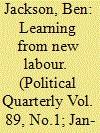

|
|
|
|
|
| Summary/Abstract |
The twentieth anniversary of Labour's 1997 election victory passed without much comment last year—among other reasons, the hectic pace of political developments left little space for historical debate. But two revealing reflections on New Labour's legacy did surface towards the end of 2017. James Graham's play about the recent history of the Labour party, Labour of Love, debuted in London in late September and Gordon Brown's memoir, My Life, Our Times, was published in November.
|
|
|
|
|
|
|
|
|
|
|
|
|
|
|
|
| 8 |
ID:
092646


|
|
|
|
|
| Publication |
2009.
|
| Summary/Abstract |
This article argues that the Labour Party has no new vision for British social democracy. New Labour in Government is intellectually tired and lacks ideological vision. Gordon Brown's leadership is managerial and lacking robust ideological content. These problems exist in a period of severe recession and whereby the Conservatives under David Cameron are in the ascendancy. The argument in this article asserts that revisionism is required in the Labour Party. An ideological revisionism which reconnects the Party with an overt vision of social democratic politics; which reconnects the Labour leadership with activists and supporters; and which inspires the next generation of Labour voters.
|
|
|
|
|
|
|
|
|
|
|
|
|
|
|
|
| 9 |
ID:
117799
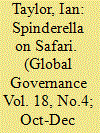

|
|
|
|
|
| Publication |
2012.
|
| Summary/Abstract |
Under New Labour, the British government was claimed to be operating under guidelines that sought to have an ethical dimension to British foreign policy. A particular focus of New Labour's foreign policy, rhetorically at least, was Africa. During this period, London sought to bring the G8 in line with London's claimed policies vis-à-vis the continent. However, upon closer analysis, vocal flourishes and presentations aside, policy was never adequately supported by, and in many respects was contradicted by, much of what Blair's government actually did in relation to Africa. The disparity between the high-profile media presentation of policy and what was actually delivered by Blair and company in Africa reflected a wider problem in the British polity that New Labour and its spin doctors came to symbolize.
|
|
|
|
|
|
|
|
|
|
|
|
|
|
|
|
| 10 |
ID:
084486
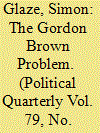

|
|
|
|
|
| Publication |
2008.
|
| Summary/Abstract |
As is well known, New Labour is often presented as an alternative to the conventional preferences of the left and right in British politics. Less commented upon is Gordon Brown's self-conscious appeal to the thought of Adam Smith in doing so. Brown claims to have rescued Smith from those on the right that interpret his 'invisible hand' metaphor from The Wealth of Nations to represent dogmatic advocacy of free markets. Rather than interrogate this view, Brown attempts to complement it with the 'helping hand' that Smith supposedly proffers in The Theory of Moral Sentiments, in order to stress New Labour's resolution of 'enterprise and fairness.' I argue that Brown instead reiterates the academically discredited Adam Smith Problem, in which the moral 'Smith' is deemed subordinate to the economic 'Smith,' and that his use of these erroneous characterisations highlights his commitment to a set of preferences usually associated with the right.
|
|
|
|
|
|
|
|
|
|
|
|
|
|
|
|
|
|
|
|
|